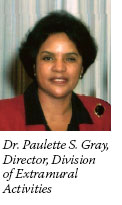
Guest Update by Dr. Paulette S. Gray
Electronic Grants Submission: Are You and Your Institution Ready?
 The National Institutes of Health (NIH), including the National Cancer Institute (NCI), provide extensive financial support for researchers in the United States and throughout the world to understand, prevent, and cure diseases and chronic disorders. Acquiring NIH support begins with the submission of a grant application. Until now, this process has been entirely paper based, requiring extensive organization, printing, scanning, and data-entry hours - both on the investigator's end and at NIH.
The National Institutes of Health (NIH), including the National Cancer Institute (NCI), provide extensive financial support for researchers in the United States and throughout the world to understand, prevent, and cure diseases and chronic disorders. Acquiring NIH support begins with the submission of a grant application. Until now, this process has been entirely paper based, requiring extensive organization, printing, scanning, and data-entry hours - both on the investigator's end and at NIH.
Beginning this winter, the application process will transition from a paper-based operation to an electronic grants submission system. This ambitious changeover will occur in stages, beginning with the December 1, 2005, submission deadline for small business applicants. We expect the entire transition to be completed by May 2007.
Electronic submission should provide a more efficient system and allow NIH to shorten the cycle from application receipt to award. Early feasibility studies using Academic Research Enhancement Awards saved enough time to allow an extra month between the request for applications and the submission deadline. The new system will save countless hours of human effort and millions of pieces of paper per year - an important contribution to environmental conservation. Applicants also will have faster access to summary statements and peer review outcomes.
For members of the cancer community who will apply for NIH funding using the new system, it is time to start preparing. Many familiar aspects of the grants process will be changing. Perhaps foremost, after the transition we will no longer use the PHS 398 forms. Instead, investigators will need to use the SF 424 Research and Related application. There will also be several new steps to the application process. Importantly, before any of their investigators can submit an electronic application, each institution must register with www.Grants.gov, the government's access point to electronically find and apply for competitive grant opportunities from all federal grant-making agencies.
In addition, both the investigator and the investigator's institution will need to complete a one-time registration with the NIH Electronic Research Administration (eRA) Commons. Unlike before, only the institution's Authorized Organization Representative (AOR) for Grants.gov will be able to perform the actual application submission, and the application must be verified online by the AOR/Signing Official and the principal investigator before submission is considered complete. This will require advance planning and collaboration between investigators and their institutions.
So what are the main things investigators and institutions can do to prepare?
- Register early with Grants.gov and the eRA Commons. Investigators and institutions must do this and should not wait until the last minute. Even if the appropriate forms are complete, a late registration could cause a missed deadline.
- Become familiar with the new process. An extensive amount of helpful material on this subject can be found at http://era.nih.gov/ElectronicReceipt/, which includes the transition timeline and a comprehensive FAQ on electronic submission as well as the NIH Transition Plan.
NCI's extramural staff are ready and willing to help make this transition as seamless a process as possible. We look forward to working with you during these exciting times.
|